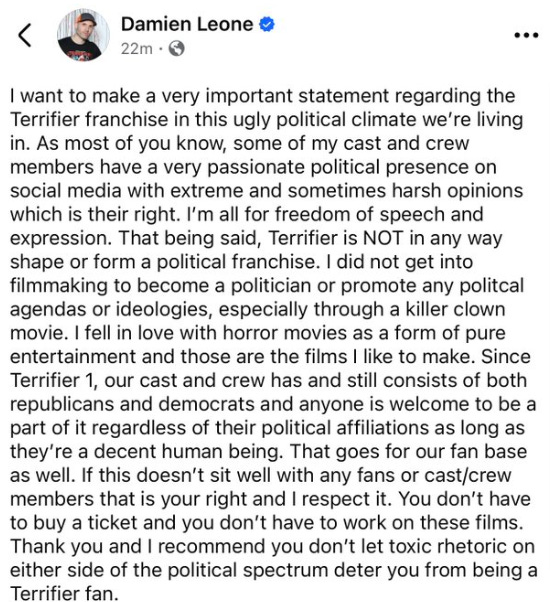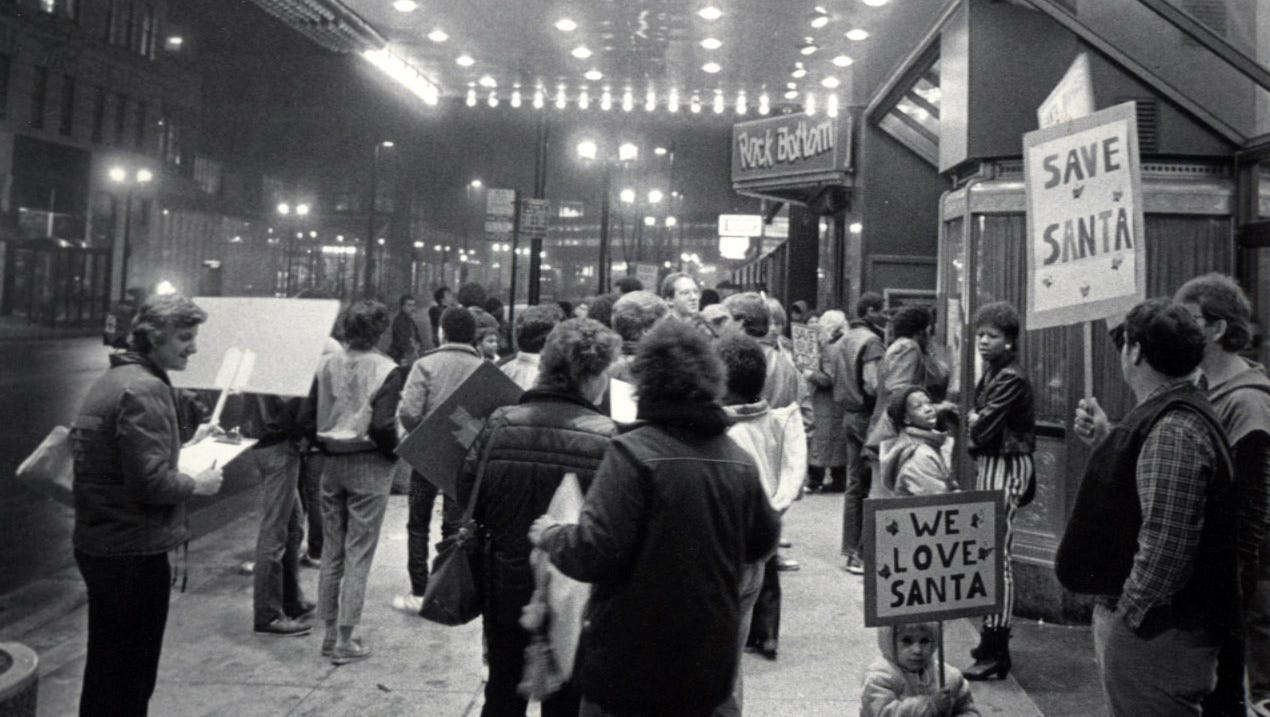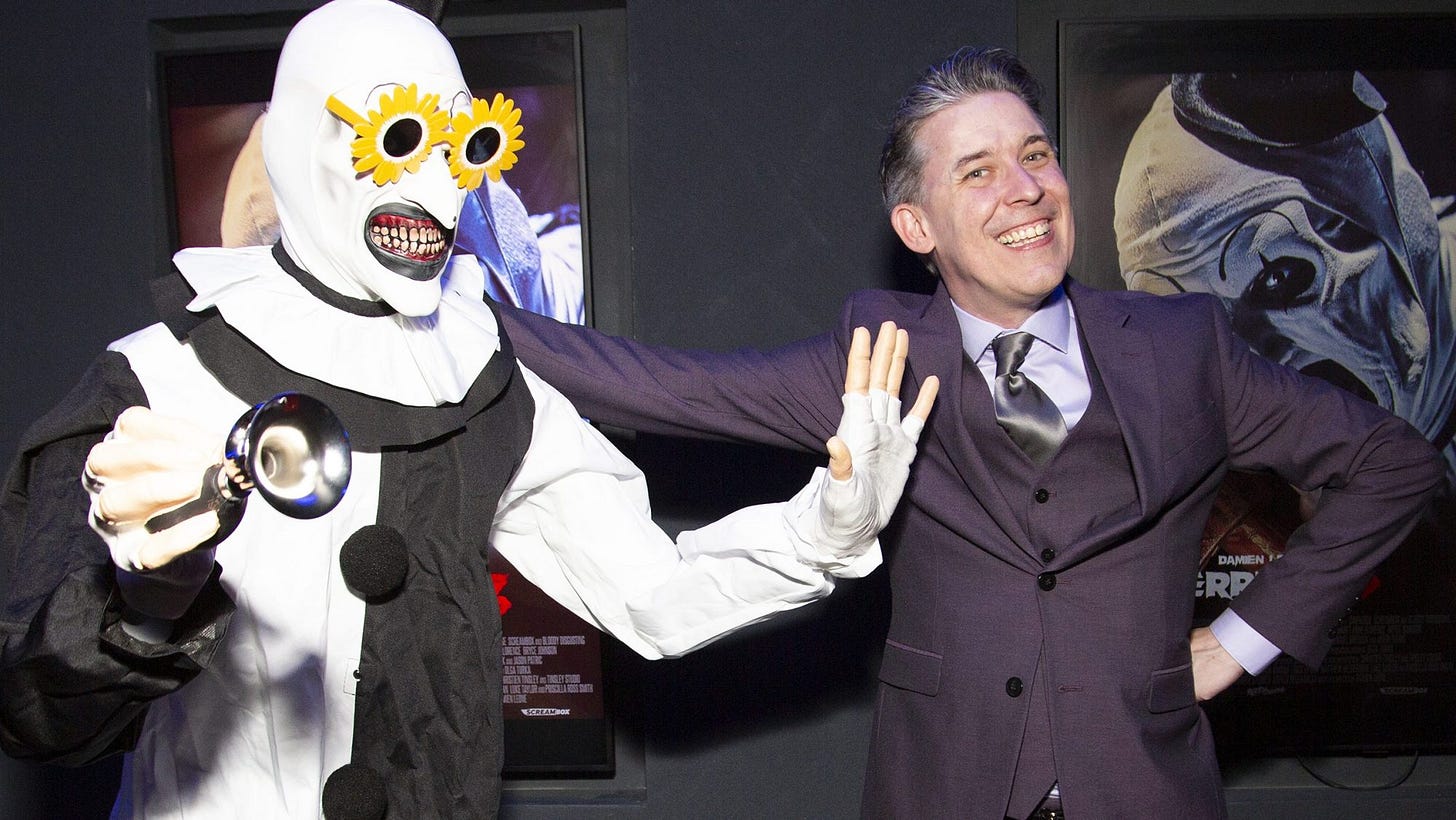Damien Leone’s Terrifier Isn’t ‘Just Entertainment’—Horror Is Always Political
Horror Filmmakers Should Acknowledge the Genre’s History of Censorship, Free Speech Battles, and Political Impact
Damien Leone, the director of the Terrifier franchise, recently made a statement claiming that his films are not political and are meant to be pure entertainment. This statement, however, has sparked backlash, and for good reason. Horror, like all art, is inherently political, whether the artist intends for it to be or not. The genre has long been a battleground for censorship, morality debates, and cultural shifts, and filmmakers should be well aware of this history, especially horror filmmakers.
For decades, horror films have been the target of political movements and censorship. The Hays Code in the United States prevented filmmakers from exploring certain themes and forced them to sanitize their work. The very existence of films like Terrifier owes a debt to the filmmakers and activists who fought against these restrictions. Without their efforts, the extreme violence, gore, and boundary-pushing elements that define the Terrifier franchise might not be allowed to exist at all.
Consider the controversy surrounding Silent Night, Deadly Night in the 1984. The film was protested by political action groups, banned in several countries, and subjected to widespread outrage. Leone himself has acknowledged Silent Night, Deadly Night as an influence on Terrifier 3, yet he seems to overlook the historical context in which that film was released. The battle against censorship, waged by filmmakers and audiences alike, paved the way for his franchise. He should be acknowledging and respecting that history, rather than dismissing the idea that his films hold any political significance.
Politics is not just about party affiliations or left-versus-right divisions. Politics encompasses societal values, cultural shifts, and the freedoms we fight to protect, such as free speech and artistic expression. The very act of releasing an unrated film in theaters, as Leone did with Terrifier 3, was a political statement against the MPAA’s grip on the industry. Whether he acknowledges it or not, his film pushed the boundaries of free expression in the same way that past horror films did when they challenged censorship boards.
What makes Leone’s statement even more disappointing is its context. The statement was clearly addressing his film’s lead, David Howard Thornton, who portrays Art the Clown. Thornton has only used his platform to express support for LGBTQ+ groups and to take a firm stance against fascism and Nazism. These are all positions that should be uncontroversial to any decent human being. So why did Leone feel the need to distance himself from these statements? There are a few possibilities: he may be trying to appeal to a broader audience for financial reasons, he may genuinely misunderstand the implications of his own work, or he may simply have made an ill-advised attempt to stay out of controversy.
What Leone fails to recognize is that if censorship or moral outrage were to gain traction again, Terrifier would be one of the first franchises targeted. His work would be blacklisted in an instant. We are already seeing books being banned for their content. Films could easily be next. The so-called “Video Nasties” era in the UK during the 1970s and 1980s proved that horror films are easy scapegoats for reactionary political movements. Horror classics like The Texas Chain Saw Massacre, The Last House on the Left, Possession, and The Evil Dead were all banned or heavily censored because of moral panic. If it happened then, it can certainly happen again. And that is political, whether Leone likes it or not.
For more on the Video Nasties, check out my short documentary on the subject below.
So Leone has two options: either he doesn’t know his history, which would be deeply disappointing for a filmmaker in this genre, or he is more concerned with maintaining a politically neutral image to avoid alienating certain audiences. Either way, his response feels like a betrayal to the very spirit of indie horror. His franchise has been built on defying the mainstream industry’s restrictions, yet when it comes time to stand by the people who have helped elevate it, like David Howard Thornton, he chooses to distance himself instead.
Leone needs to understand that his movies do stand for something, whether he intended them to or not. Terrifier 3 gave the finger to the MPAA, changed the landscape for indie horror, and followed in the footsteps of films that challenged the system. If he refuses to see that, the Terrifier franchise risks losing what made it special, becoming just another forgettable killer clown movie. And that would be a real shame.





Damien’s statement was refreshing coming from Hollywood…why isn’t anyone at the Oscars/Netflix stating the same thing about Karla Sofia Gascón?! I mean it’s ridiculous. Hollywood is in bed with the Democratic Party and their far left ideology and Karla got a taste of the authoritarian left…hopefully this is the end of “Woke” Hollywood? Who knows but Damien is trying to eloquently navigate a political pendulum swing that is happening in the culture and please both sides in a commendable way. He knows where it’s going with the rise of the right (probably for the next 12 years at best, in my opinion) and he wants to make his movies as is. I’m sure he will reference politics big time at some point like bring Art to the White House! They did with Chucky! lol
Please… enough is enough. Stop trying to make everyone take a side. There is absolutely nothing wrong with what he said. Social media comments both past and potentially future by one or some involved with a film should not be seen as a statement for all or the franchise itself. What you have written is manipulative and I am sick of this style of propaganda. Essentially trying to pull everyone into being on one side or the other. Your diatribe goes far beyond what he was attempting to convey. I haven’t read the social media comments of Thornton. But you claim that every “decent” human being would see them as uncontroversial. This may be so, as I said I haven’t read them. But I also know as a gay man, there are many statements that claim to be supportive of LGBTQ+++++ that I personally find offensive. For one, I feel that there has been a hijacking. Many fought for equal rights, the right to get married, etc. We had come so far, but now there are these people who will never be happy and will always want more. It went from being treated equal, to being special. And I don’t want to be a part of that. And neither do many others. Time for some do-gooders to wake up.